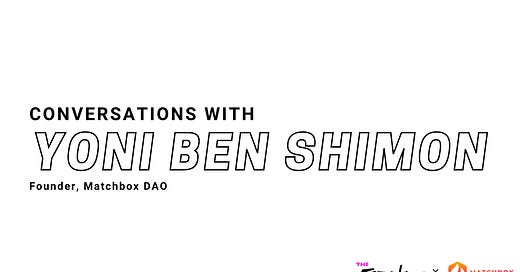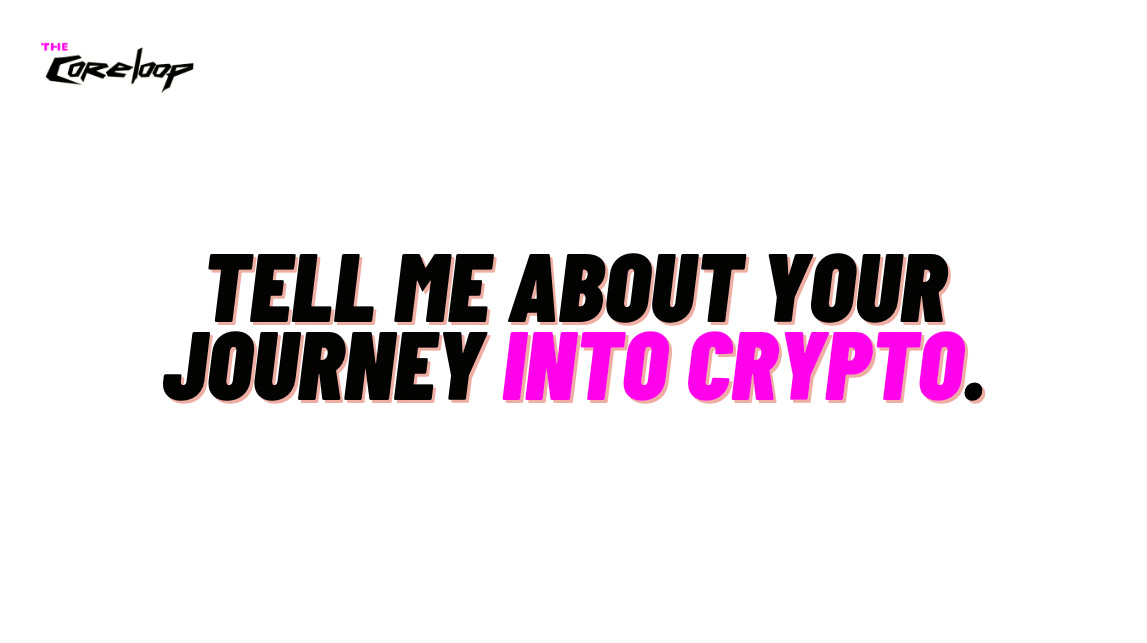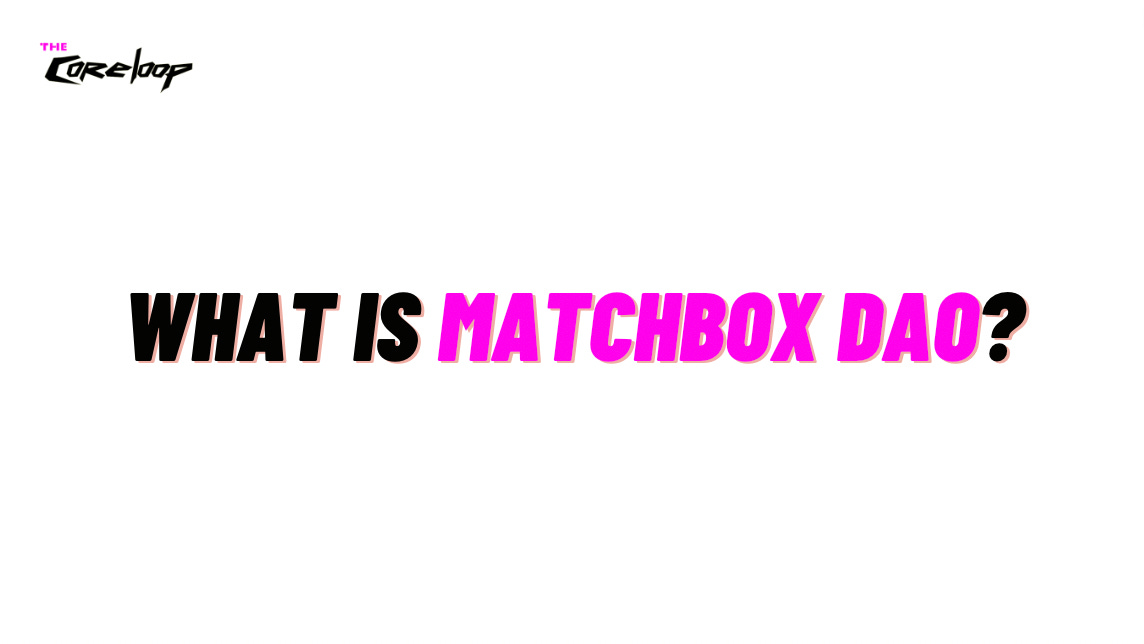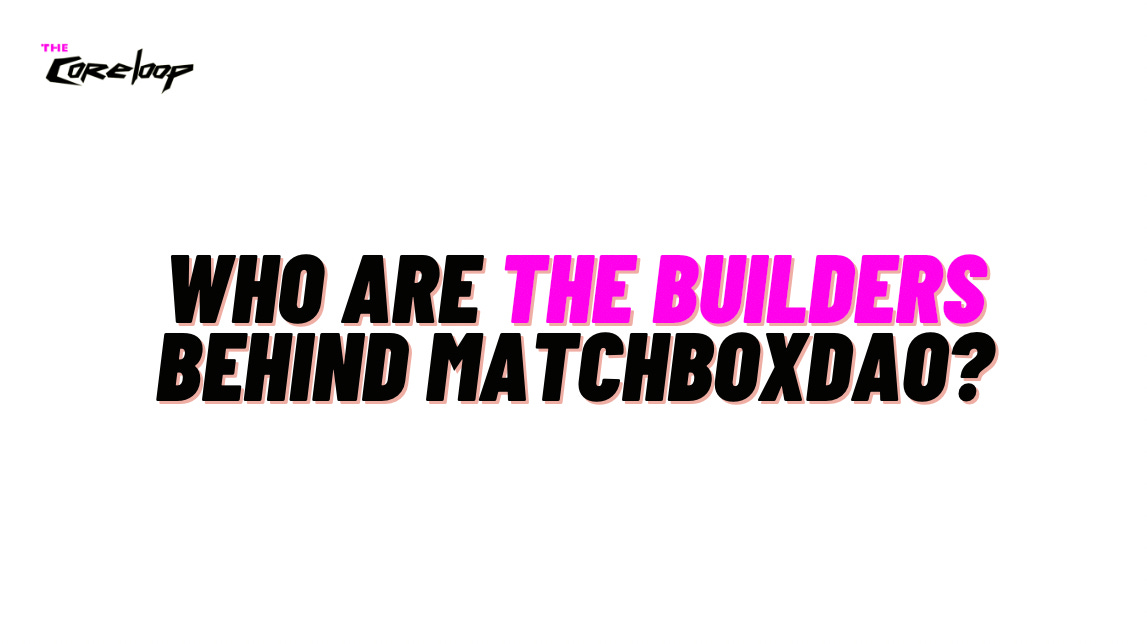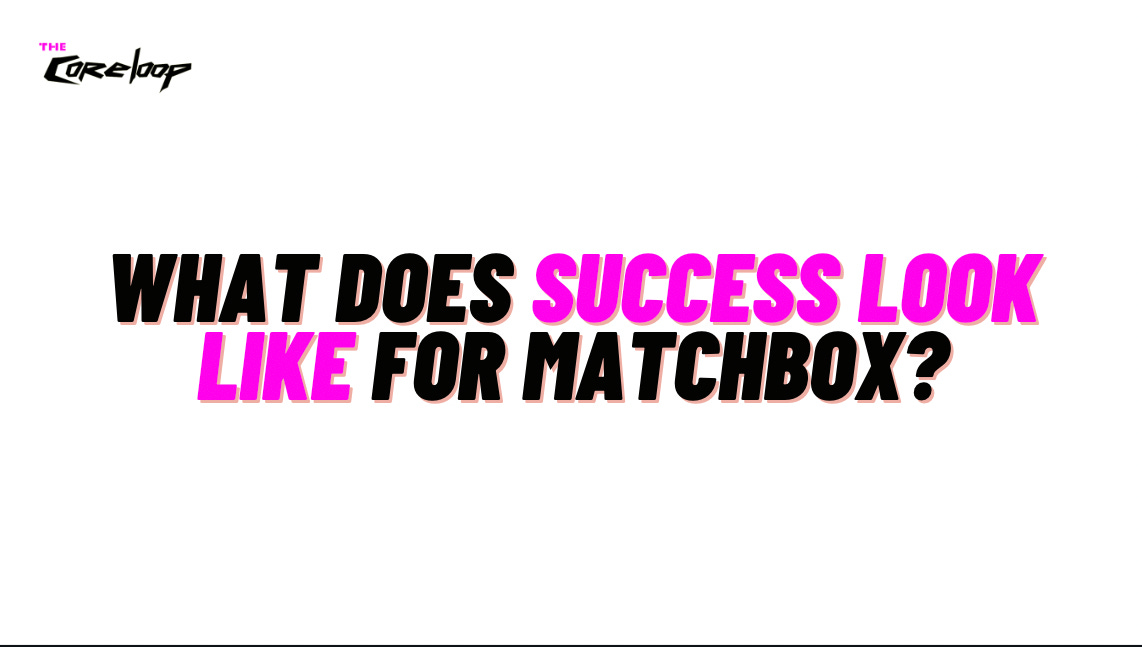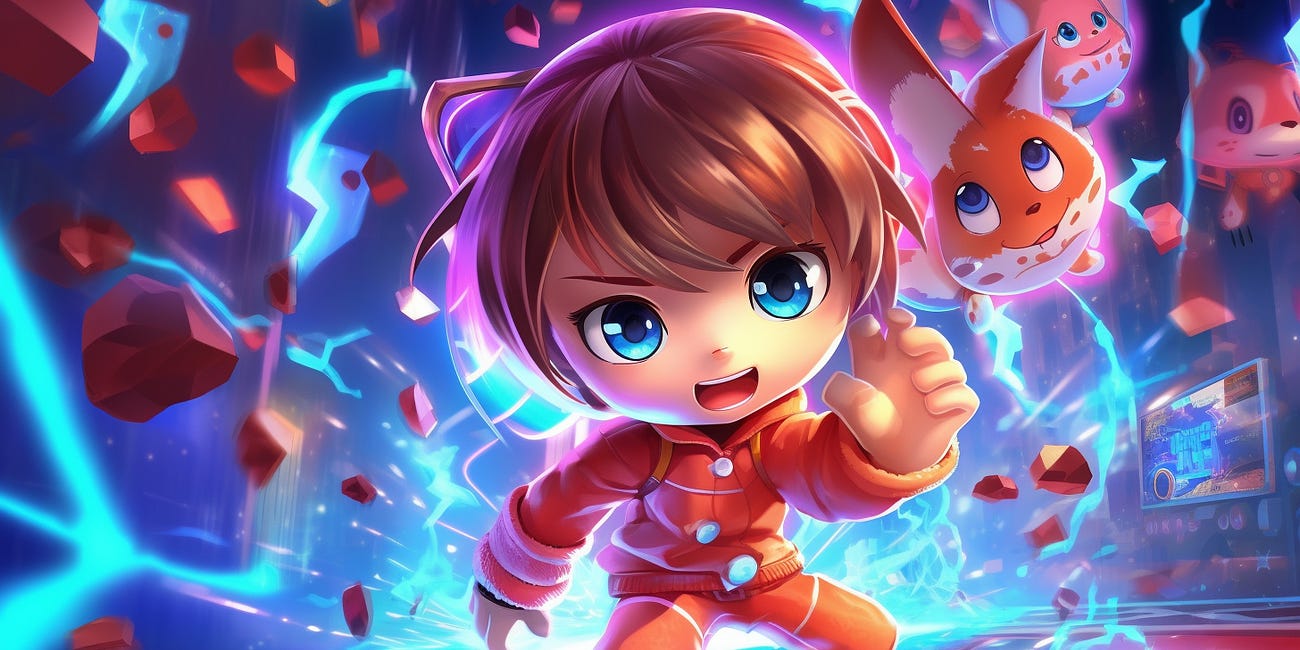Conversation w/ Founder of MatchboxDAO (Yoni Ben Shimon)
This is your host 0xkapital_k and here is a conversation with MatchboxDAO’s fearless founder, Mr. Yoni Ben Shimon. We talked about all things from his origin story into crypto down the rabbit hole to onchain gaming and we ended with a little peek into the man behind the founder. You can watch the video below or keep scrolling to read the transcript of the conversation! Enjoy, anon!
VIDEO
CHAT TRANSCRIPT
TL;DR: My journey into crypto began in 2012 when I bought some Bitcoin and got fascinated by the idea of a new asset class. I followed the developments of Ethereum and invested in various blockchain projects. Eventually, I started Matchbox to explore the potential of onchain games and maximize our chances of being part of the next big success story.
Yoni: Okay, so when I was 21, after I got out of the army, because army is a mandate story in Israel, I was working as a hedge fund like in Israel. And all the time I was thinking about type of different financial assets, like bonds, like mutual funds, stocks, whatever. And in 2012, I saw an ad on Bitcoin and it says like, the world currency.
So I said, how could it be possible that there is a world currency because currencies are usually for countries and so on. So I thought it's a new asset class. So I bought some Bitcoin and that's what got me into the rabbit hole.
And then in 2014, Vitalik came to Israel and was trying to understand how Ethereum should look like before it was called Ethereum. And I heard his talk and that was really inspiring for me because the idea is that everyone could create a financial asset and put everything behind the financial asset, like create any meaning to that financial asset was very appealing to me.
So I was following very closely until Ethereum did a Presale and participated in this Presale as well. And since then it was basically a Cambrian explosion of new things after Ethereum came along, like forks of Bitcoin and both applications on Ethereum.
So I've been investing in all of the things that came until now and followed every new use case of blockchain. Because from the financial perspective, it was very fascinating to me that every different use case is basically way to bring people together and create value together. And this idea of creating value together, financial value was very appealing to me.
So I followed all of the different waves and different innovations and maker and file coin and all of that and also created a couple of other projects with different groups of people around area that I thought was cool.
Like I had a social investment DAO called On Fund and I started like NFT Museum and the artist community and some other things. And about a year ago, I just saw dark forest. And basically what I saw there is an application that people build on top of.
So I thought like, okay, so we saw protocols like Ethereum and others very successful because they are gaining the value of the developers. Like developers are building on top of them. And that's why all of these layer ones and layer2s become so valuable.
And what I saw in 2022 or 2021, I think 2022 was an application the first time that I saw an application that people built on top of. And so I thought like, okay, maybe that's a hint for the next thing that will bring us the next bull and the next killer app and I was trying to invest in it and I discovered it's not possible to invest in it.
So I started Matchbox in order to get exposure for this potential new category. So this is why I started matchbooks.
TL;DR: Matchbox DAO aims to maximize the potential of onchain games by focusing on both centralized and decentralized efforts. Our core team is building infrastructure and games internally, while our ecosystem efforts include grants, hackathons, direct investments, and partnerships with crypto companies. We believe partnerships can help make games and bring in users, which is crucial for the success of onchain games.
Yoni: Okay, so Matchbox DAO basically is aiming to maximize the call options on the future of onchain games. So that's how I think about it. Like what can we do in order to increase the chance?
So our belief is that there will be an onchain games that have millions of users and worth billions of dollars and it will happen within the twelve to 18 months we believe. And we think how can we maximize the chance for us to be part of that party?
And so for that we have two different efforts. One is centralized decentralized, one is like concentrated, let's say, and one is less distributed. And so in networks we have a core team and we have an ecosystem.
So the core team is basically like around seven people that are building infrastructure and games internally right now we are building the game 0xTitan and the card game for that. And we're also building an infrastructure for that, like both an infrastructure to run this game and both infrastructure to make it on chain like zero knowledge privacy layer.
So that's internally.
But we know that what we are doing, maybe we are wrong, maybe our approach is not the right approach. So what we are doing besides that is ecosystem efforts. So some of the ecosystem efforts and ecosystem partners that we are doing are grants hackathons, direct investments and partnerships. Hackathons is basically a way to get a lot of ideas fast. And we did like five of those grants. We gave like 200 or $300,000 of grants out of which there was like two or three projects.
We are doing direct investments in people that are already building games and infrastructure for games. So we did like maybe ten or twelve of those and we are trying to help them connect them with each other. But the thing that I'm the most excited about on this area is partnerships.
What kind of partnerships? So partnerships that either help games succeed or help make games. So partnerships that help make games is partnerships that we are doing with crypto companies in order to make games.
So we are doing that partnership already with Aura that are building on Cosmos. So we are doing a MultiChain casino. That is one example for such partnership. We are doing a partnership with Nethermind to create games that are using. So the idea with these kind of partnerships is using established organizations in crypto and make games with them that will potentially help them to get the next generation of users.
So we hope to make more of these partnerships because we believe that the human resources are already there and the distribution is already there and the primitives is already there.
So you just need to speak with balancer, uniswap like the algorithmic, stable coins, the farms, whatever and do partnership with them. So there is this kind of partnerships and the other kind of partnerships is help games thrive.
So we are speaking with a few games thinking very much in the beginning, to be honest because we are not sure what is the best ways to get users to onchain games because it's about different topics, it's about the mechanism design, it's about the eyeballs, it's about the right type of distribution, it's about the right type of incentives. So we are thinking very strongly about how to be a publisher but we are speaking with a few games.
All of us are telling that the only thing that they need is users. They don't need, they don't need the help with development, they don't need the so they only need users.
And so we believe if we'll crack that how to get users to on train games, which is a very hard question, we will also be very beneficial to the industry, like the autonomous world. And MUD ecosystem is building a lot of games, but none of them have more than a few thousand users at best. And it's not because they are bad games. Maybe also maybe some of them are bad games but it's mainly because other things like maybe bad mechanism design, maybe bad distribution, maybe not enough people know about them and so on.
So we are trying to crack that as well. But that covers I guess most of the ways that Matchbox is trying to maximize the amount of call options on the future of onchain games.
TL;DR: The core team behind Matchbox DAO consists of me, Elie for business development, Nathan as the product lead, and developers like Nick. We also have a network of collaborators who contribute significantly to our strength. We value motivation and adaptability in our team members and believe that partnerships are more powerful than solely relying on internal hires.
Yoni: Our core team currently is me is Elie on the business development side of things. Ellie is the brother of Louis from Starkware and is very good is ex VC. People in VC tend to be also good business development guys. So he is helping getting all of the big crypto companies to play the game as you know, like the different participants.
And then we have Nathan that is a product lead, is responsible for basically translating what me and Ellie have to say to the development department. And then we have designer, or even two designers, I think.
So Nick used to be a builder in Starkware. Before that, he built an oracle that called ZK graph. It's like the graph. And he's basically entrepreneur. Before that, he built other projects.
Nathan is still young. He's only 23 or 24. He did a computer science degree and worked a little bit in a tech company in Israel. But what I like the most about Nathan is that he's learning very fast, adapting very fast, and very motivated. And I feel that motivation. And if you're generally smart and very motivated, you can do much more than someone that is very knowledgeable but lazy. So I feel Nathan has a very potential as an individual because he's very motivated and very want to succeed. And he have a very good intentions and he's smart. So I feel that I have very big hopes for him because he's generally smart, very motivated, although his experience is not massive because he's only 23, 24.
So this is the core team, and then we have all the network of collaborators.
I guess the main power of Matchbox DAO is in the collaborators. That's why I'm trying to now expand the business development department, because I feel that this partnerships approach is very powerful, like to use others strengths instead of trying to recruit everyone, trying to work with people. And when we work with people, you can tap into other resources. So I feel that this approach of partnerships is more powerful than just the approach of hiring people.
TL;DR: It's important for Matchbox to "dogfood" ourselves, meaning we build things internally alongside investing in others. This approach allows us to have operational strengths, agility, and the ability to explore unique ideas that others may not be pursuing. We want to be able to experiment and have a strong team that can quickly turn ideas into working products.
Yoni: Yeah, so I feel you need to have both like dog fooding yourself, building stuff yourself, and both investing in others. Because when you are only investing in others, you don't have any moat, any strength yourself, and you don't have a strong organization. The organization is fluffy. All you have is money. Uniswap is much more powerful than paradigm in terms of influence, even if paradigm have more money than Uniswap because they have operational strengths.
So, two reasons. One. I want to have this operational strengths and agility to do stuff that we think is cool without waiting for others to do it because there are things that no one is doing and it's still a good idea. I want to try it out. Like, for example, the reason why we did 0xTitans was because we thought it's a good idea.
We saw others are excited about it, especially developers and no one did it as a serious thing like Paradigm did it, but they didn't do it as a serious thing, they just do it as a CTF, as an experiment so that kind of things is our thing that you must do yourself.
So I thought we must have our internal strengths, because there will be a lot of those things, things that are good ideas that maybe someone else build and you can revive, or maybe something you want to build from scratch that no one else is doing. And we must have a strong team that can get something from zero to working product in two months. And if we'll have that, we can do much more those experiments, and we can increase the chances for us to eventually be in that party that we want to be in.
So it could be Titans now and it could be something else in the future. There is a lot of things that you can remake both in DeFi and in games, and you can tweak and you can play with. And having this team of like seven or eight developers that are building stuff fast, I feel it's valuable because some of the things others are not building.
So I feel that having these quick experimentations internally, having this force is valuable. So that's why we did both investing stuff and both internal stuff.
TL;DR: Success for Matchbox means being a contributor to the next innovative application with millions of users. We aim to be part of a success story that brings something new to the table and utilizes crypto primitives in a meaningful way. Whether it's through building ourselves, supporting others, or forming partnerships, we want to participate and contribute to the empowerment of people through blockchain technology.
Yoni: Success look like if we are a contributor in the next success story. So I'll tell you what a success story look like, something like an innovative application that was not exist before and millions of people are using.
So some examples for success stories in crypto, could be curve, could be uniswap, could be potential, potentially could be Axies and StepN. Axies and StepN in have a lot to learn from, but they did some mistakes, that's fine. But if Axies and StepN was more sustainable then definitely I would say Axies and StepN.
But there are still amazing things to learn from in my opinion. And what else could be a success story? Like these kind of protocols that are unique and bring something new to the table and hopefully are not financial like Lens could be that success story, for example.
So these kind of things so I'm saying game but intentionally. I'm not mentioning the word games because I don't want to limit the way it's going to look like because I feel that this thing could look like LSD, or it could look like Ohm, or it could look like Farmville, or it could look like DeFi Kingdom or a wolf game or I don't know how it will look like. Maybe it will be with the front end, maybe without the phone and maybe that phone, maybe that phone, I don't know.
But I just think that something that will reach millions of people and will use crypto primitives in a new way and will help distribute something and will do some dynamics that is currently not possible for people.
I think that so the goal of Matchbook is to be part of that.
What is to be part, even to be 5%, even if to be 10%, I don't care, but I just want to be part. And it could be part by building it ourselves or supporting others or partnering with others. I don't care. I don't want to be necessarily the one that build it, maybe, but not necessarily.
So this is the goal to maximize the chancethat we will be part of something like that. Just want to participate, just want to feel that I was part, I was contributing to something that helps empower and just give it to the people. Understood? Yeah, basically help to push the blockchain space forward. I feel that I will feel that I need something meaningful.
It doesn't matter if I was the one that built it or I was just like a contributor to it.
TL;DR: Onchain gaming is the focus for Matchbox because we believe it's the next phase of innovation following the copycat phases of ICOs and NFTs. We are in a realization phase where people understand that onchain games need to be more than just traditional games with tokens. We are in a post-hype period where a more realistic mindset is prevalent, and we believe now is the right time to explore the potential of onchain gaming.
Yoni: So I think that every innovation is coming after a copycat phase. And so take for example, the 2017 ICO Boom. First it was imagined as getting web, two websites plus tokens, right? And then like the 2021 NFT boom.
First it was imagined like, selling pictures, and then like the 2021, I think, or 22 play to earn boom. It was first imagined as web two games, AAA games plus tokens. But going back to 2017 after the crash, what came is uniswap. I feel that we are now in the phase where we are in the realization phase of both of the NFT Hype and the play to earn Hype, where people understand that it's not going to look like web2 plus token.
We need something new.
And now post Hype period, everyone is more realistic in their mindset. So I think the the right mind, we have the right mind in place of people that are trying starting to think about real native applications that are so I'm starting to see more and more and more people that are thinking in the right direction to make something unique.
And you have also the infrastructure supporting it. So you have infrastructure like Mud, you have infrastructure like layer2s that are more cheap and 0xMonaco is an example for something that is new.
I think that having something that is not possible without blockchain is a very good approach because at least you are ensuring it's not going to be marginal innovation. It's going to be a complete new, either a completely new failure or success story. I don't care.
I don't care to fail. I want to fail another ten times. I want to fail. I don't care to fail. But I want to try things that can succeed. Like I want to try things that the chance to success is another 50%. I don't care about 50%. I care about either making the biggest change that was like the biggest thing that was done until now or not making anything.
But I don't want to make something that is marginally better, that's less interesting. So I feel that we are in the right time, we are in the right mindset after the hype and the infrastructure is in our side and people are starting to come up with some really innovative experiments and that's why I think that maybe we have a good chance to see something happening with this combination of things.
TL;DR: The defining experience that shaped who I am today was when my mother bought me books by Warren Buffett at 16. These books taught me the power of collaboration, storytelling, and creating financial freedom. They inspired me to embrace cryptocurrency as a tool for liberation and helping others achieve independence. Going from zero to one, reaching financial milestones, is crucial, and crypto offers unique opportunities for value creation and ownership.
Yoni: Oh, thank you for asking this question. This is a nice question.
So I guess the thing that defines what I am the most was that my mom bought me books of Warren Buffett and these kind of things when I was 16. So she bought me The Intelligent Investor and Warren Buffett biography and all these kind of things. And what I got out of these books is how a person and I was growing up in in a poor in a poor childhood, which is not bad, like I think it was it was a good catalyst for me.
But but what I took from these books is that with the power of collaboration and the right stories, people can create value into things, into financial value and freeing themselves and freeing themselves so coordinated stories that people are mutually agree on can rise the tide.
And that's what I took from that books because what are financial assets? What's differentiate between companies that are more successful have higher multiples and other companies that have lower multiples?
It's only like the story that they are creating around them and with crypto it's a tool to make people free. So I feel that I feel that that's the most important thing in my life to help people get free. Like I got free from crypto to help other people to get free from not in a bad way, not like play to earn or something like that.
Just like by believing in the same thing together and coordinate on stories. It's the first time that people can freeing themselves. I think freeing yourself from zero to one is still the most important thing for most people in the world.
Although it's not a popular thing to talk about it, I still think that for most people in the world, like to go to $100,000 net worth or something, that they can start thinking independently is the most important thing in their life. I feel there is a lot of ways to achieve it.
And that's why games are so cool, because they are so general.
A way to coordinate people and to simulate things. You think like if someone is not in crypto how can he create value by supporting his time to something? Like it's very hard, you know, like he can join a company, I don't know what he can do like but he's getting options. Even, even like joining a company is basically a scam. Like all of the employees ways of employing people in equity is basically a scam. Why? Because they give him options. So he's fucking like putting his time into the company but they can revoke the options after. So it's not really putting his time but he gets rugged because they are not giving him the actual equity of the company. They can take it away because of different rules like cliff and stuff like that.
So in crypto if you are getting the token, the token is yours. Like if you're doing NFT mint, if you are participating in a DAO, if you are doing is yours and that you can create value for yourself, for your energy but anywhere else in the world it's very hard to go from zero to one.
That’s a warp for our conversation with Yoni, founder of MatchboxDAO. We hope you got as much out of this conversation as we did. Thecoreloop is long-term bullish on MatchboxDAO and its team of builders.
For more content like this, be sure to smash the subscribe button below!
For this week’s alpha calendar check out or WAGME Newsletter 👇
Weekly Alpha Gaming Metaverse Expedition (WAGME) #12 — 22nd May
thecoreloop’s Substack is a proof-of-concept for the platform we are building. Subscribe to stay in the loop & be shortlisted as our alpha testers.
For daily news subscribe to our Telegram Channel
h/t to thecoreloop contributors: @0xkapital_k @chng_raymond @cloudxgmf @wassiecapital @iandaog @playtern @friandoteth @0xconglomerate @itsmebambamCT

